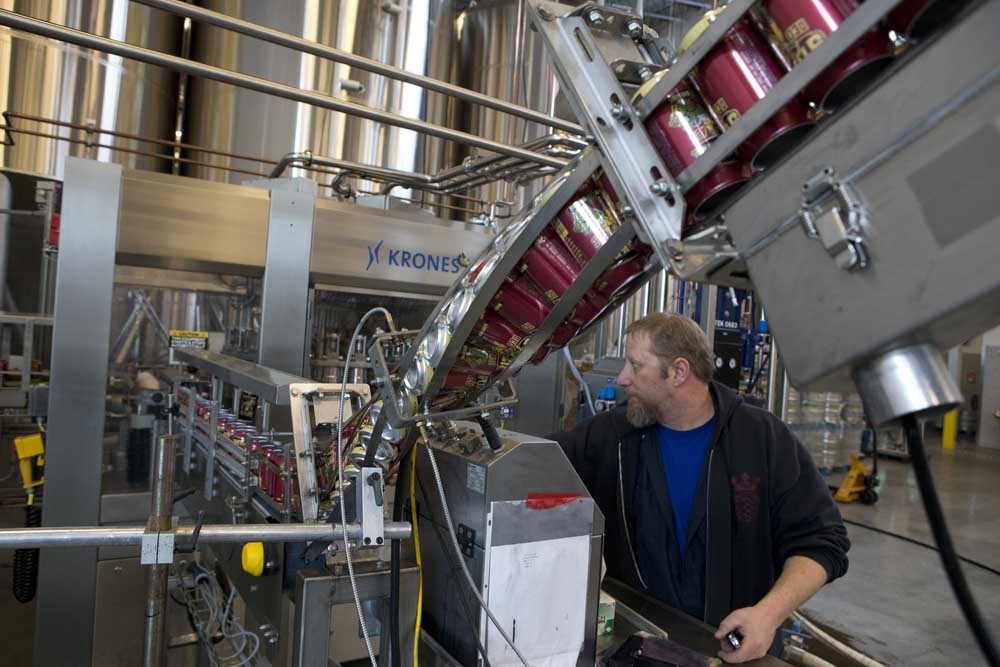Bend brewers weigh potential aluminum tariff
Published 12:00 am Saturday, March 3, 2018

- Worthy Brewing Co. packaging manager John Cooper checks on the Krones canning line as it fills cans with beer at the Bend brewery Friday. (Andy Tullis/Bulletin photo)
Craft brewers were mostly not pleased Friday with President Donald Trump’s proposal to impose a 10 percent tariff on imported aluminum.
“This is gong to hurt,” said Brewers Association President and CEO Bob Pease. “Not every craft brewery cans, but it’s going to impact thousands of small businesses in a significant way.”
Glass bottles remain the predominant form of packaging craft beer; 42 percent of it leaves the brewery in bottles versus 16.7 percent in cans. But canning, a trend in craft brewing that took hold about five years ago, has steadily grown. From one local brewer putting beer in cans in 2013, now at least seven of 36 in Central Oregon are doing so.
Deschutes Brewery last year installed a $5.5 million canning line that started service this year. CEO Michael LaLonde, in an emailed statement Friday, said an aluminum tariff, basically a tax on imported aluminum, although meant to protect American industry, would do the opposite.
“Policies like this may appear to protect our national economy on the surface,” LaLonde wrote, “but they can actually end up doing more damage by making it harder for small and mid-sized breweries like ours to compete with the larger breweries who can buy in greater volume. Ultimately, the customer loses with increased costs for that can of craft beer.”
Ryan Duley, marketing director at Sunriver Brewing Co., said the proposed tariff caught his attention, but he’s not sure yet what cost it will add if it comes into effect.
“It’s like hops. Prices are going up, but they’re going up for everybody. It’s part of doing business,” he said. “Is this going to do anything or not? Right now, we’ll keep doing what’s in front of us.”
Larry Sidor, co-founder of Crux Fermentation Project, in Bend, said he expected a “fairly insignificant” cost increase.
“At this point, I’m welcoming it,” he said. “I’d rather buy aluminum from a country with environmental controls and labor laws and unions and lawyers and all that.”
The White House on Thursday announced plans to impose a 25 percent tariff next week on imported steel as well as the 10 percent duty on aluminum. Trump used a Cold War-era law that allows the president to reduce imports deemed a threat to national security. In this case, a Commerce Department study last month concluded imported metals erode the nation’s capacity to make military hardware.
Canada supplies most aluminum imported into the U.S., 59 percent between 2012 and 2015, according to the U.S. Geological Survey. Ninety-eight percent of can-sheet aluminum, which is turned into cans for the beverage industry, is made in the U.S. of raw materials imported from Canada, Pease said.
“I don’t think can-sheet (aluminum) is a threat to national security,” he said. “The Brewers Association supports fair and free trade, but we’re not so sure tariffs are the way to go about that.”
The Brewers Association, a trade group that represents independent breweries that produce 6 million barrels annually or less, joined with the Beer Institute, which represents larger brewers such as MillerCoors and Anheuser-Busch, to oppose the aluminum tariff. Outwardly, the two sometimes have conflicting goals, as when multinational brewing companies buy up smaller craft brewers to increase their market share. Pease said the two have a common cause in this case.
“It’s not surprising,” Pease said. “We work cooperatively with the Beer Institute on a number of issues.”
The Beer Institute, on its website, states the tariff would add $340 million a year in costs to an industry that generates $350 billion in economic impact in the U.S. At the other end of the scale, craft brewers contribute $67.8 billion annually to the U.S. economy, according to the Brewers Association.
— Reporter: 541-617-7815, jditzler@bendbulletin.com








